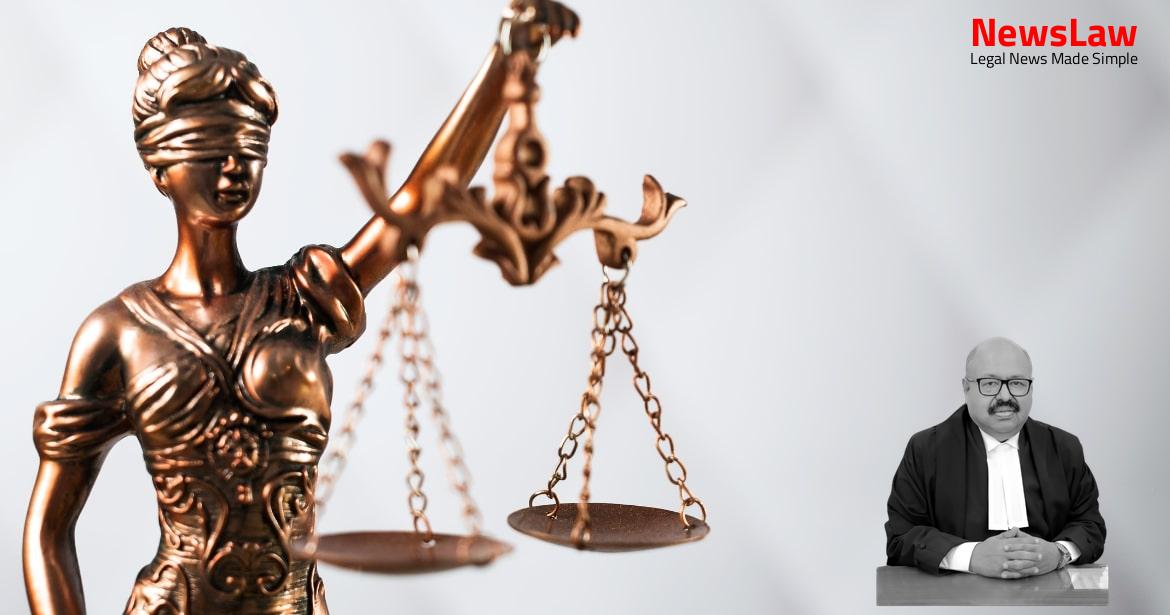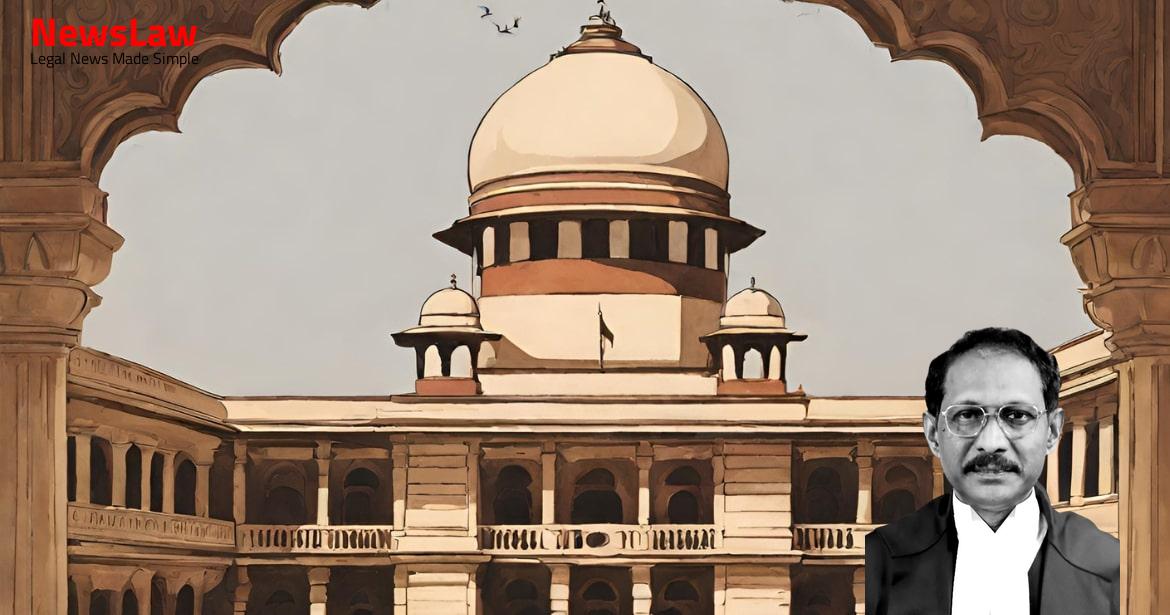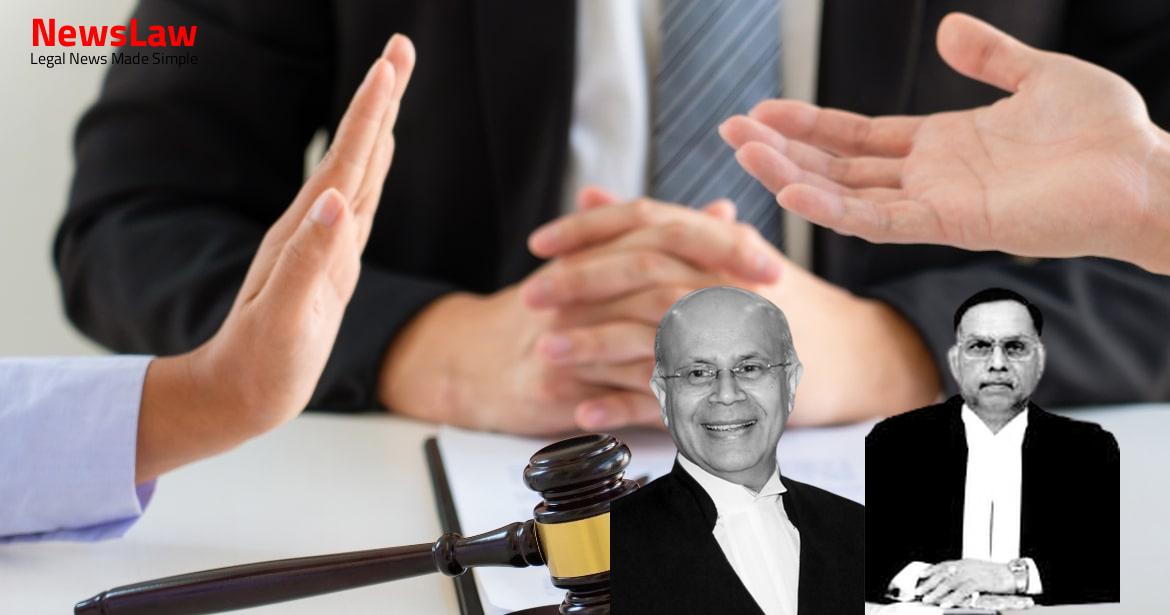In a landmark legal judgment, the Supreme Court of India has upheld the conviction of an accused in a forged signature case without mentioning the parties involved. The case revolved around the expert opinions and legal presumptions related to the forged signature. This ruling sets a precedent for future cases involving similar circumstances. Stay tuned for a breakdown of the judgment and its implications.
Facts
- The trial court held the appellant, who was a Postman, responsible for the forgery of the signature ‘D. Mohan’ on a delivery slip.
- The appellant frequently visited the complainant’s house, becoming familiar with the signature of PW-2-Devesh Mohan.
- Based on evidence from prosecution witnesses and hand-writing experts, the trial court convicted the appellant under Sections 467 and 468 IPC.
- The appellate court and the High Court upheld the trial court’s decision on proper analysis of evidence and expert opinions.
- The High Court noted discrepancies between the disputed signature and the specimen signatures of Devesh Mohan.
- The appellant failed to provide an explanation for the signature, leading to a presumption against him.
- The trial court considered the opinions of three hand-writing experts, with one stating the signature was made by Devesh Mohan.
- The other two experts found that the disputed signature did not match the specimen signatures.
- The High Court’s dismissal of the revision petition confirmed the appellant’s conviction under Sections 467 and 468 IPC.
- The prosecution examined several witnesses including hand-writing experts to prove the charges against the appellant.
- The appellant, who was a postman, was accused of forging signatures on a delivery slip for an envelope containing valuable securities.
- Complaints were made to the Post Office and Senior Superintendent regarding the missing envelope and forged signatures.
- Hand-writing experts confirmed that the signatures on the delivery slip did not match with the specimen signatures of the accused.
- The case was registered under relevant sections of the Indian Penal Code, and investigations were carried out by the C.B. C.I.D.
- Reports from both private and Forensic Science Laboratory hand-writing experts were used as evidence in the case.
- The son of a deceased hand-writing expert provided testimony based on his father’s previous findings in the matter.
- The investigation revealed that the appellant had indeed forged the signature on the delivery slip, leading to the misplacement of valuable securities.
Also Read: Judgment on Service of Summons and Authenticity of Power of Attorney
Arguments
- Appellant’s counsel argues that the appellant’s conviction cannot be sustained without proof of signature forgery on Ex.-P4 delivery slip.
- Counsel raises concern over the court not considering the handwriting expert’s report in favor of the appellant.
- Argument presented regarding the unproven report of the hand-writing expert Siya Ram Gupta.
- Challenge against the High Court’s presumption and shifting of burden of proof onto the appellant.
- Respondent-State’s counsel supports the prosecution’s evidence and the conviction of the appellant by the lower courts.
- The prosecution presented evidence of Dr. M.L. Varshney (PW-3) sending a registered envelope to Dr. K.B. Varshney on 09.04.1992.
- When Dr. K.B. Varshney did not receive the envelope, a complaint was lodged at the Sub-Post Office and with the Senior Superintendent of the Department of Posts.
- Defense counsel argued that reliance on hand-writing experts without independent corroboration is not sufficient for conviction.
- Counsel cited the case of S. Gopal Reddy v. State of A.P. (1996) 4 SCC 596 to support the contention that evidence must be definite and of a conclusive nature.
Also Read: Balaji v. Nargolkar: Auction Sale Set Aside
Analysis
- The evidence of hand-writing experts is considered as corroborative evidence to support the testimony of PW-2-Devesh Mohan who denied his signature in Ex.-P4 delivery slip.
- The hand-writing expert’s report from the Government Forensic Science Laboratory, Lucknow, stated that the disputed signature ‘Q-1’ in Ex.-P4 was not written by PW-2-Devesh Mohan, providing further support to the prosecution’s case.
- The High Court found that the appellant, who delivered the registered envelope to the complainant, failed to explain the alleged signature in Ex.-P4 delivery slip, leading to a presumption against the appellant.
- The opinion of the hand-writing expert, PW-5, was based on an analysis that showcased the differences between the disputed signature and the specimen signatures of PW-2-Devesh Mohan.
- Corroboration may not always be necessary before relying on the opinion of a hand-writing expert, especially considering the detailed explanation provided by PW-5 in his report.
- The conviction was not solely based on the hand-writing expert’s opinion, as other evidence and testimonies were also considered by the courts below.
- Expert opinion, including handwriting analysis, should be received with caution.
- It is unsafe to base a conviction solely on the opinion of an expert without substantial corroboration.
- Court should not treat expert opinion as conclusive, but consider it in conjunction with other evidence.
- Handwriting analysis is not infallible, and therefore, needs to be corroborated by other evidence.
- The science of fingerprint identification is highly reliable, whereas handwriting analysis has a higher risk of error.
- Judges need to form their own independent judgment based on a combination of expert opinion and other evidence.
- Prudence requires that the court ensure expert opinion is supported by other evidence before relying on it.
- Expert testimony on handwriting identification is explicitly relevant under Section 45 of the Evidence Act.
- It is hazardous to base a conviction solely on the opinion of a handwriting expert.
- The appellant has been in custody for over eighteen months since 04.07.2018.
- Considering the occurrence dates back to 1992, the appellant’s sentence is reduced to the period already served.
- The courts found the appellant guilty of forging the signature of PW-2-Devesh Mohan under Sections 467 and 468 IPC.
- The concurrent findings by the lower courts support the appellant’s conviction under Sections 467 and 468 IPC.
- The appellant is sentenced to four years for the Section 467 IPC conviction and three years along with a fine of Rs.500/- for the Section 468 IPC conviction.
Also Read: Jurisdiction of Family Court in Cases under Muslim Women’s Protection Act
Decision
- The appellant-accused’s conviction under Sections 467 and 468 IPC is confirmed.
- The sentence of imprisonment imposed on the appellant-accused is reduced to the period already undergone.
- The High Court judgment dated 19.02.2018 in Criminal Revision No.511 of 2006 is modified.
- The appeal is partly allowed.
- The appellant-accused is ordered to be released forthwith unless required in any other case.
Case Title: PADUM KUMAR Vs. THE STATE OF UTTAR PRADESH (2020 INSC 37)
Case Number: Crl.A. No.-000087-000087 / 2020



